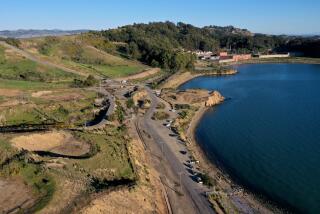Opinion: L.A. is park poor. So why is one of the most beautiful green spaces in the city locked behind a fence?
Los Angeles is woefully park poor. Less than half of L.A. County residents have easy access to a park, and three-quarters of the public spaces we do have are falling apart.
If those stats sound familiar, they should. City and county officials used them repeatedly in their successful effort to pass Measure A on last fall’s ballot, which put county homeowners on the hook — in perpetuity — for roughly $94.5 million a year in parcel taxes to expand and maintain the county’s network of open spaces.
For the record:
10:18 p.m. Nov. 7, 2024An earlier version of this article gave an incorrect City Council district for Rowena Reservoir. It is in District 4, not District 13.
Now imagine the absurdity of an immaculately manicured space in proximity to a dense L.A. neighborhood but out of reach, locked behind a towering fence for two decades — six lush acres, with a big artificial lake, waterfalls and so much greenery it has earned the nickname “Fantasy Island” among those who can see it, but can’t use it. Its official name is the Rowena Reservoir, and you might miss it if you don’t know it’s there.
From the main streets that bound the site, Hyperion Avenue and Rowena Street, where Los Feliz meets Silver Lake, it mostly looks like a landscaped berm. Owned by the Department of Water and Power, it was the site of the oldest open-air reservoir in L.A.’s system. Built in 1901, the reservoir was drained in 1991, after state health authorities deemed the open-air water storage unsafe. A dusty decade of construction and $14 million later, DWP installed a 10-million-gallon underground storage tank, refurbished the surface to its current Edenic state and called it good.
When The Times and other media outlets reported on the redo, they explained that chlorination and electrical equipment made the site too dangerous to open it to the public. Besides, what would happen if people jumped in the fake lake? (Funny, the nearby L.A. River — a dangerous flood-control channel when it’s raining and filled with treated sewage when it’s not — has always been open to all comers.)
Still, the decision to keep the area closed wasn’t terribly controversial at the time. That the buried reservoir was topped with landscaping at all was a political victory of sorts. DWP had originally intended it to be little more than an industrial facility services site. And Los Angeles was a different city in 2001. The park deficit was acknowledged, but housing was still relatively inexpensive and a single-family home with a yard to relax in was within reach of a working family.
Since then, however, L.A.’s population has increased by nearly 350,000 people — roughly equivalent to the entire city of New Orleans — making the Rowena Reservoir into a massive lost opportunity.
So why not rectify the mistake? DWP Chief Operating Officer Marty Adams, who has decades of experience overseeing the reservoir, was there for the 2001 makeover. He confirms that there are “some hazards” on the site, but he also doesn’t hesitate to agree that it could be turned into a real park.
“It has the potential,” he said, though he is quick to caution that the lake, the waterfalls and the greenery were designed for aesthetics, not public use. To open the area up would require study and retrofitting, mostly to protect and maintain the water supply below.
“DWP isn’t in the parks business,” Adams points out. “But we are open to opportunities to use our properties in different ways.”
In other words, the Rowena Reservoir isn’t a lost cause. City Council District 4, which contains it, could take it on. So could the Los Feliz and Silver Lake neighborhood councils. And if study and retrofitting are what’s required, why not consider larger possibilities as well?
Rowena Reservoir is only a few blocks northwest of the Silver Lake and Ivanhoe reservoirs, which in turn are just a short trip from Echo Park and Elysian Park. Reimagining Rowena Reservoir could potentially serve as the impetus for connecting all these public spaces, and the revitalized L.A. River. An L.A. “emerald necklace” could link Griffith Park and the river in the north to the reservoirs, Los Angeles State Historic Park, MacArthur Park and even Exposition Park in the south.
Even if such an ambitious plan never materializes, in rapidly densifying Los Angeles, every acre of green space matters.
Rowena Reservoir has been locked up for long enough. Let’s find a way to set it free.
Matthew Fleischer is the senior digital editor of The Times’ Opinion section and the editor of its Livable City vertical.
Follow the Opinion section on Twitter @latimesopinion or Facebook
MORE FROM OPINION:
Trump’s Alice-in-Wonderland approach to the Iran deal
Some wildfires simply can’t be fought
Tracking the ‘eye of God’ — a total solar eclipse comes to North America
More to Read
A cure for the common opinion
Get thought-provoking perspectives with our weekly newsletter.
You may occasionally receive promotional content from the Los Angeles Times.











